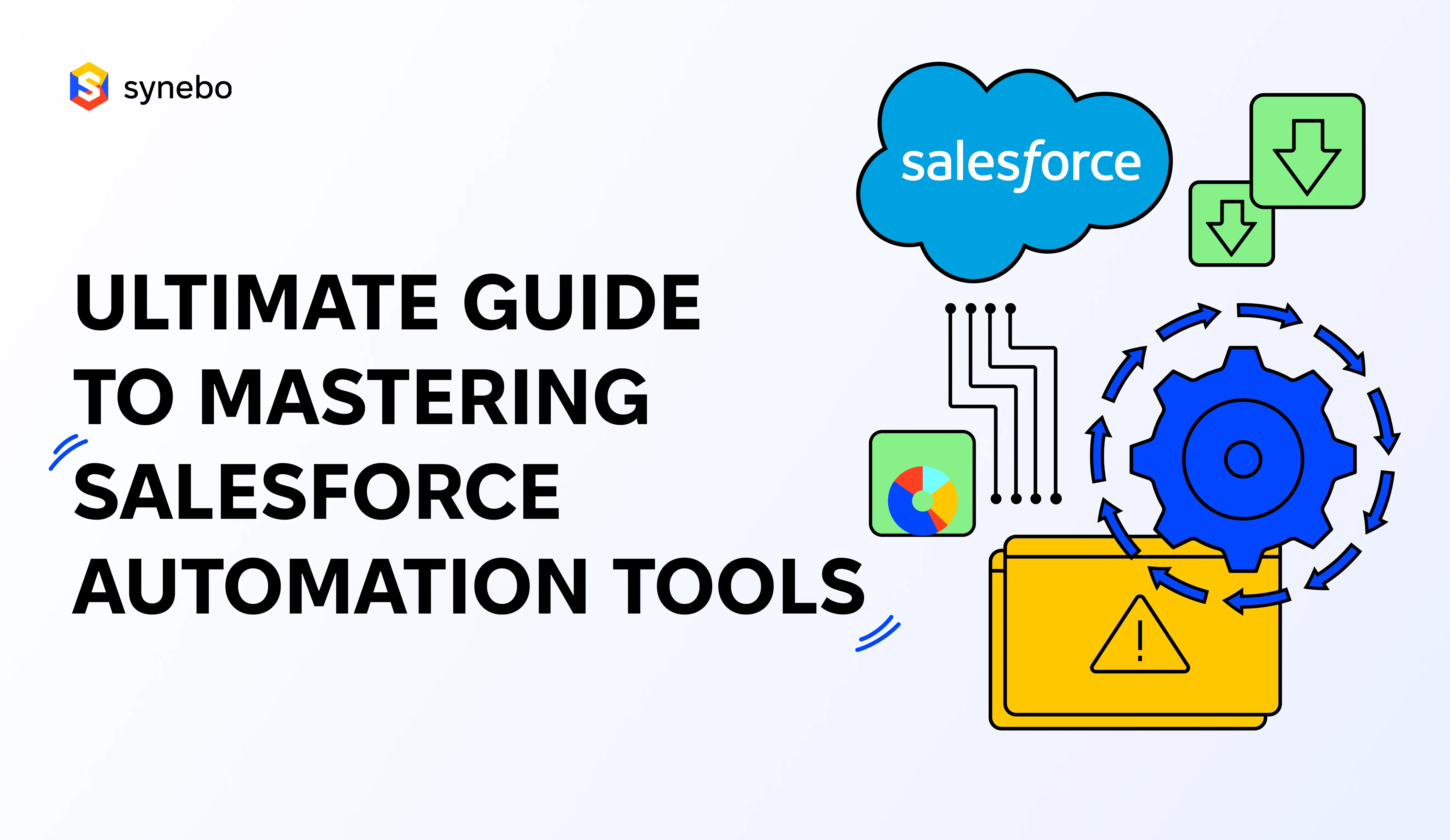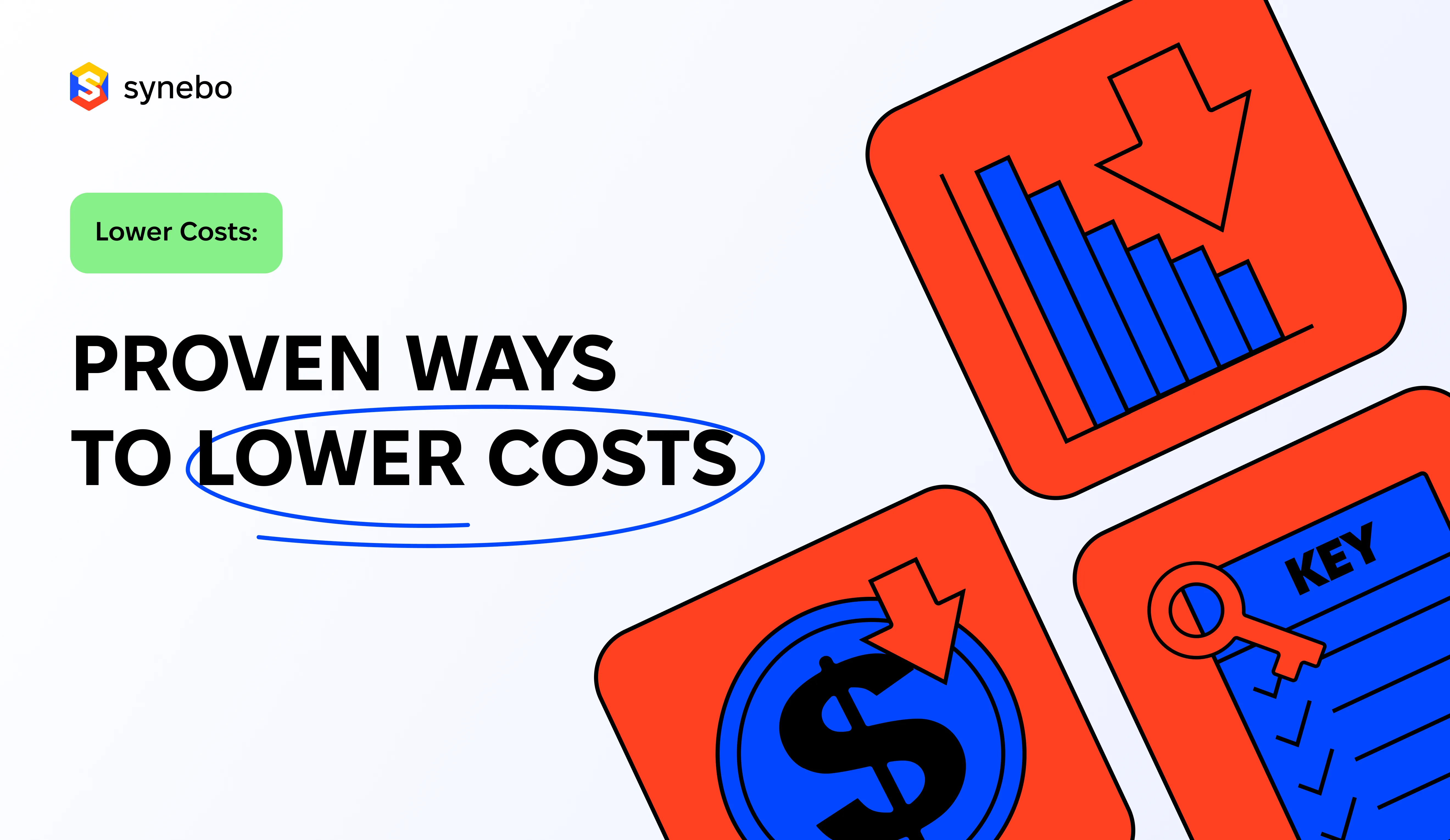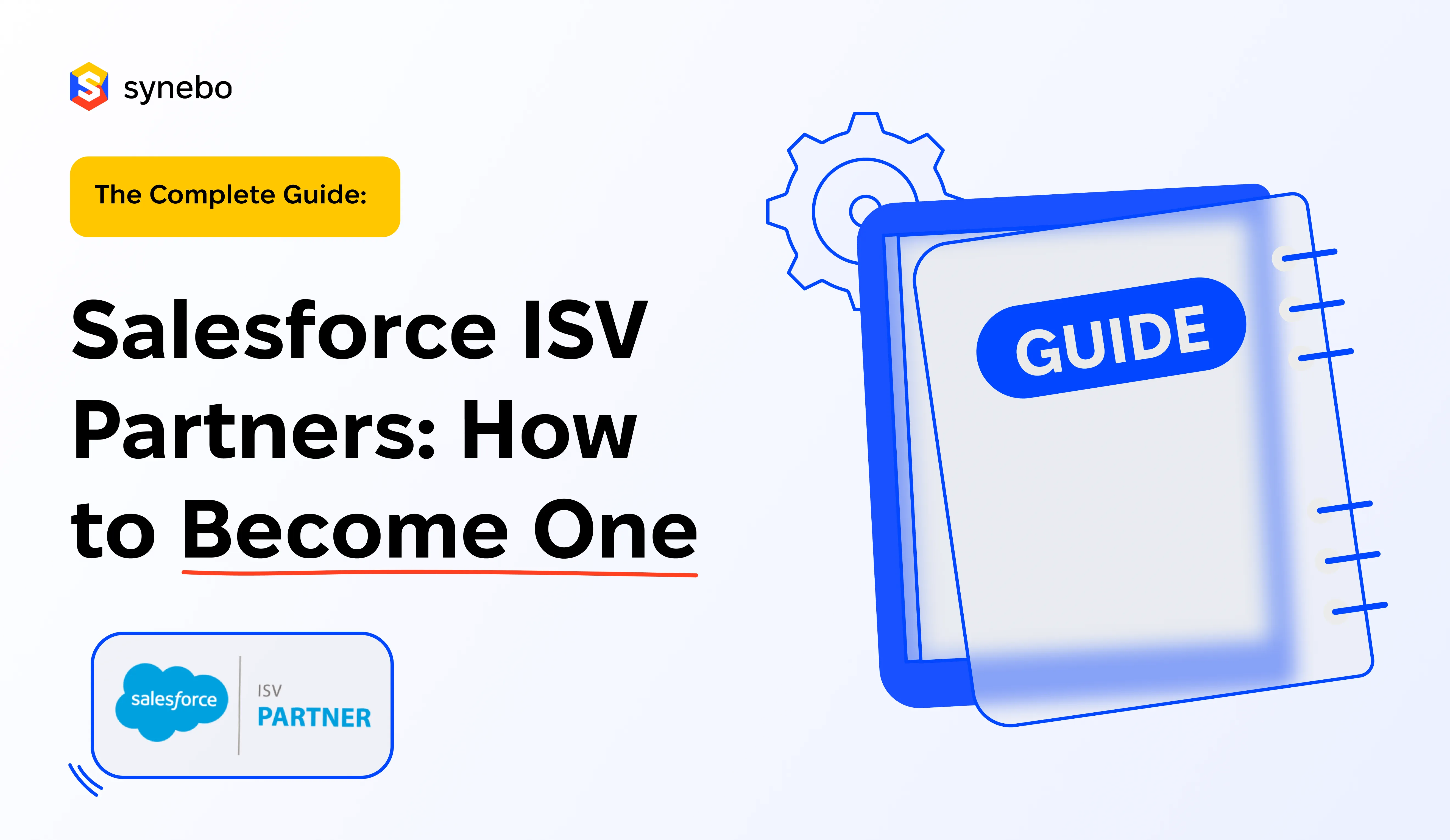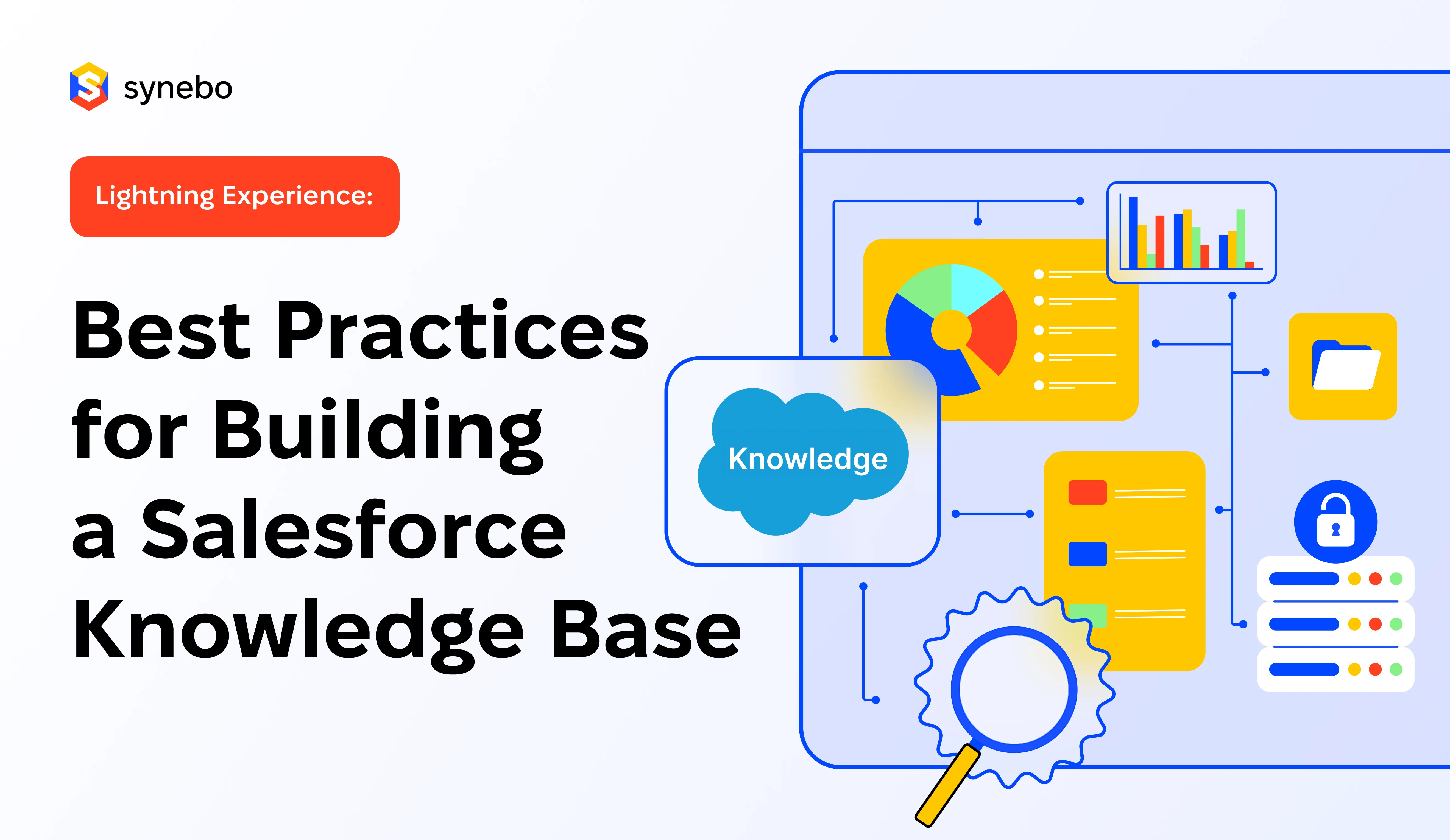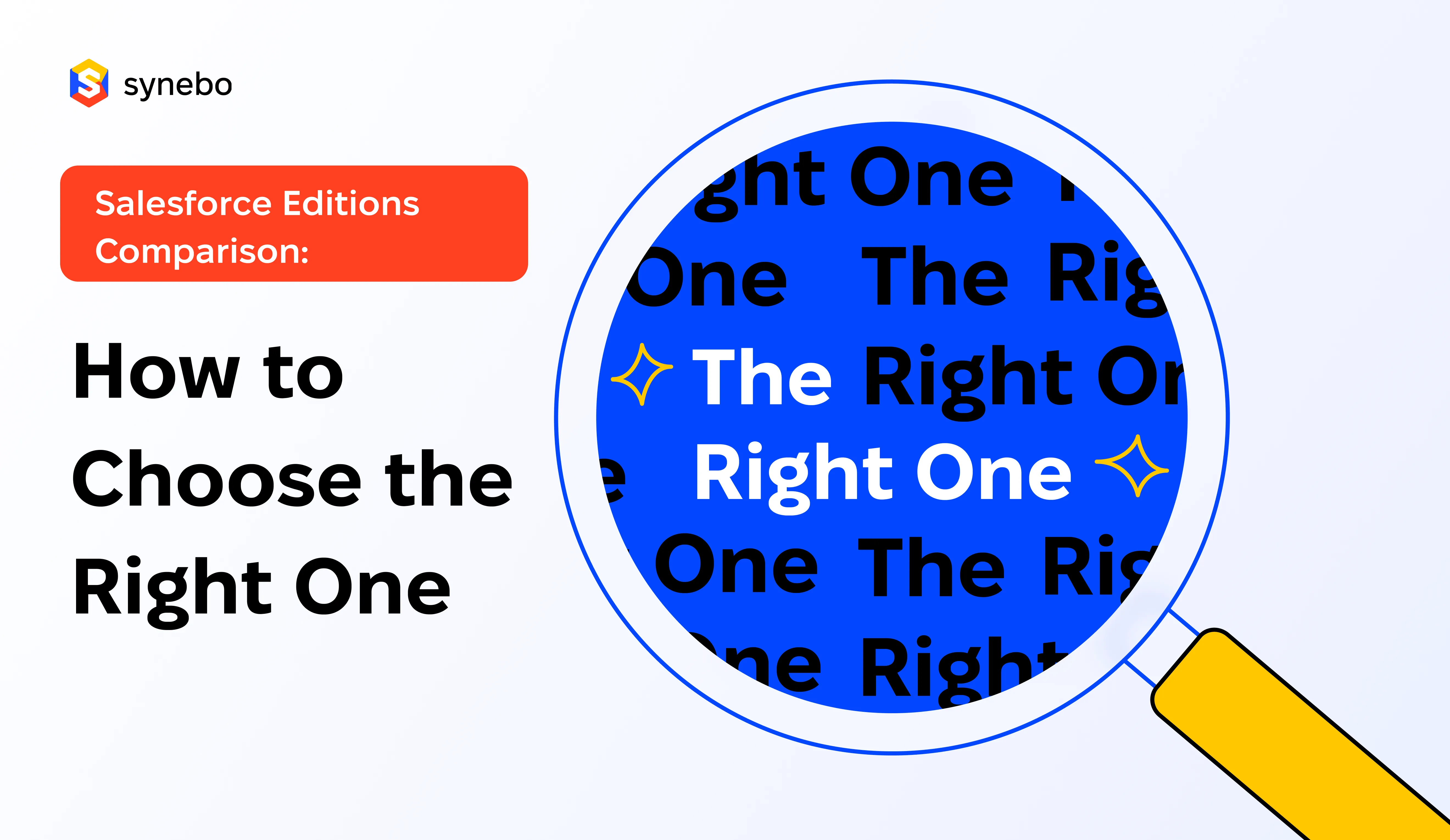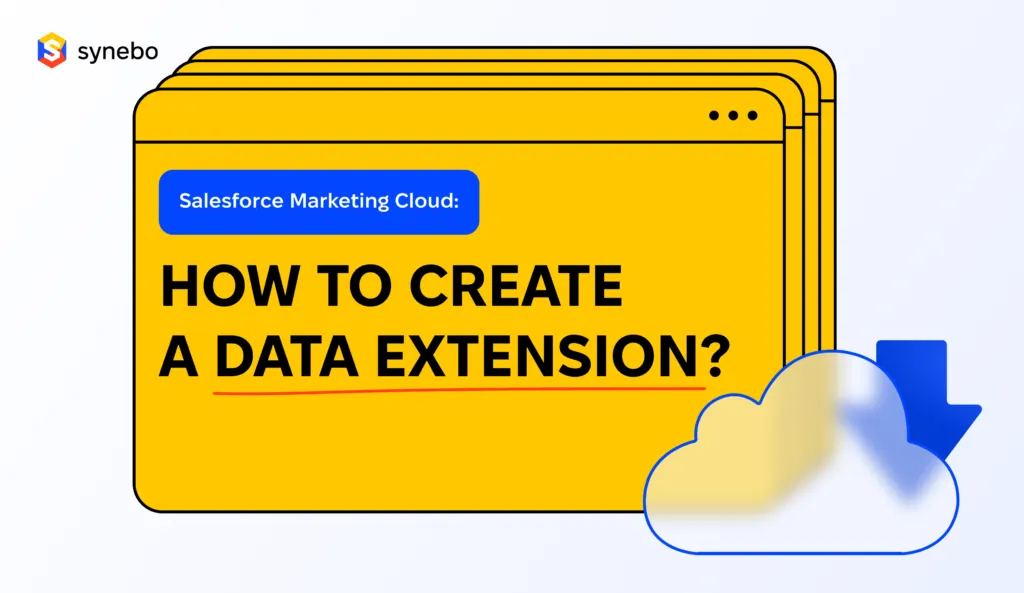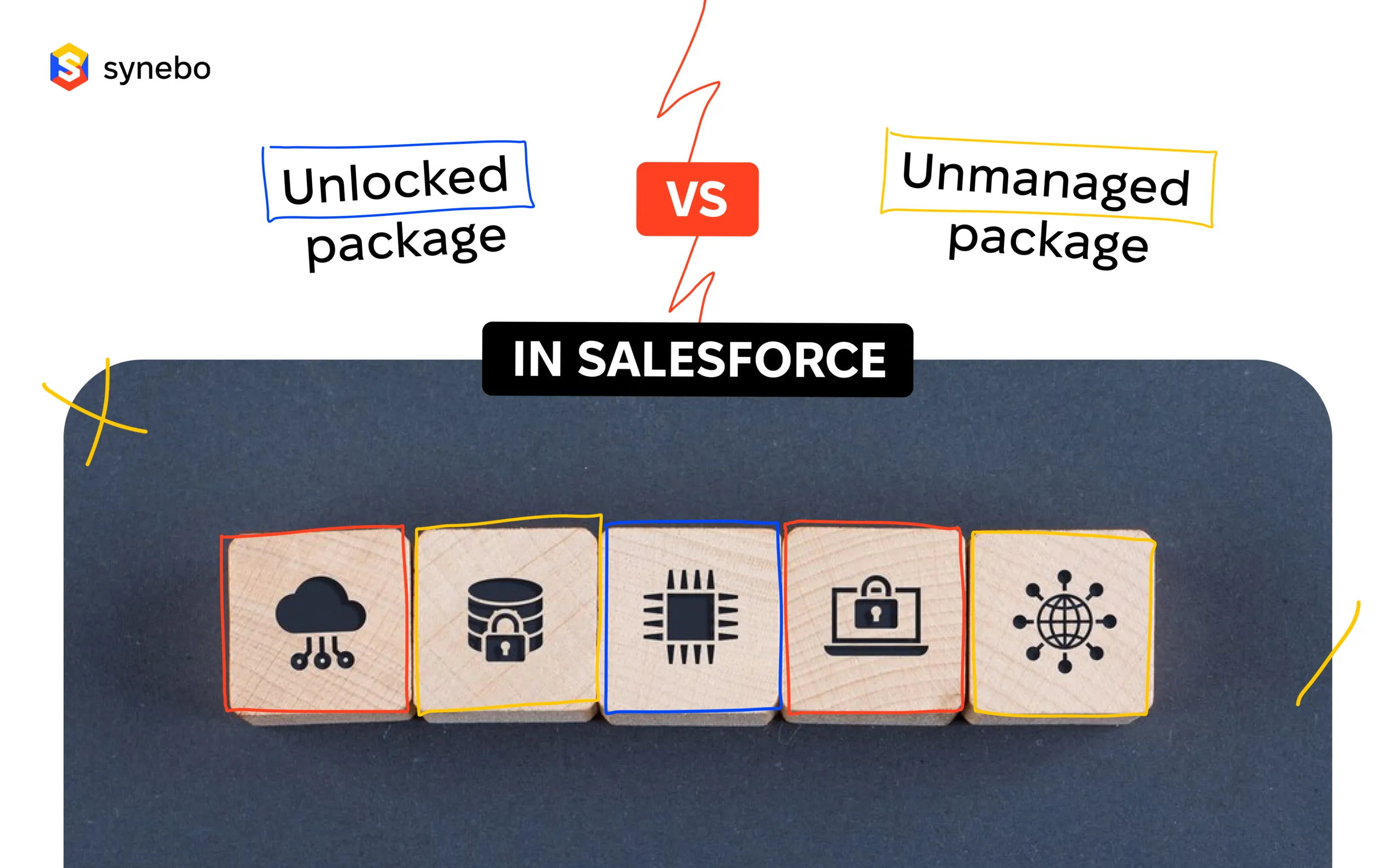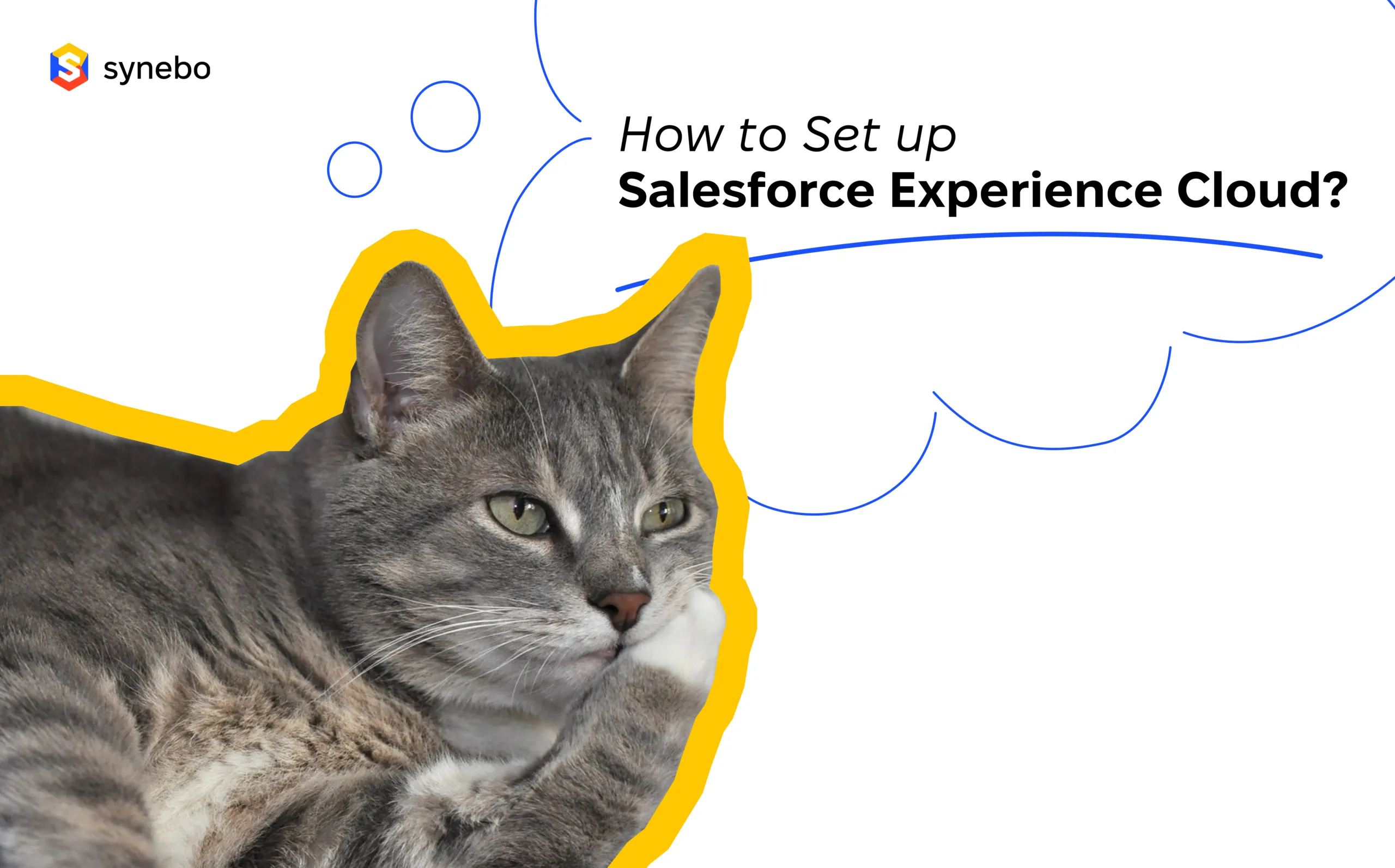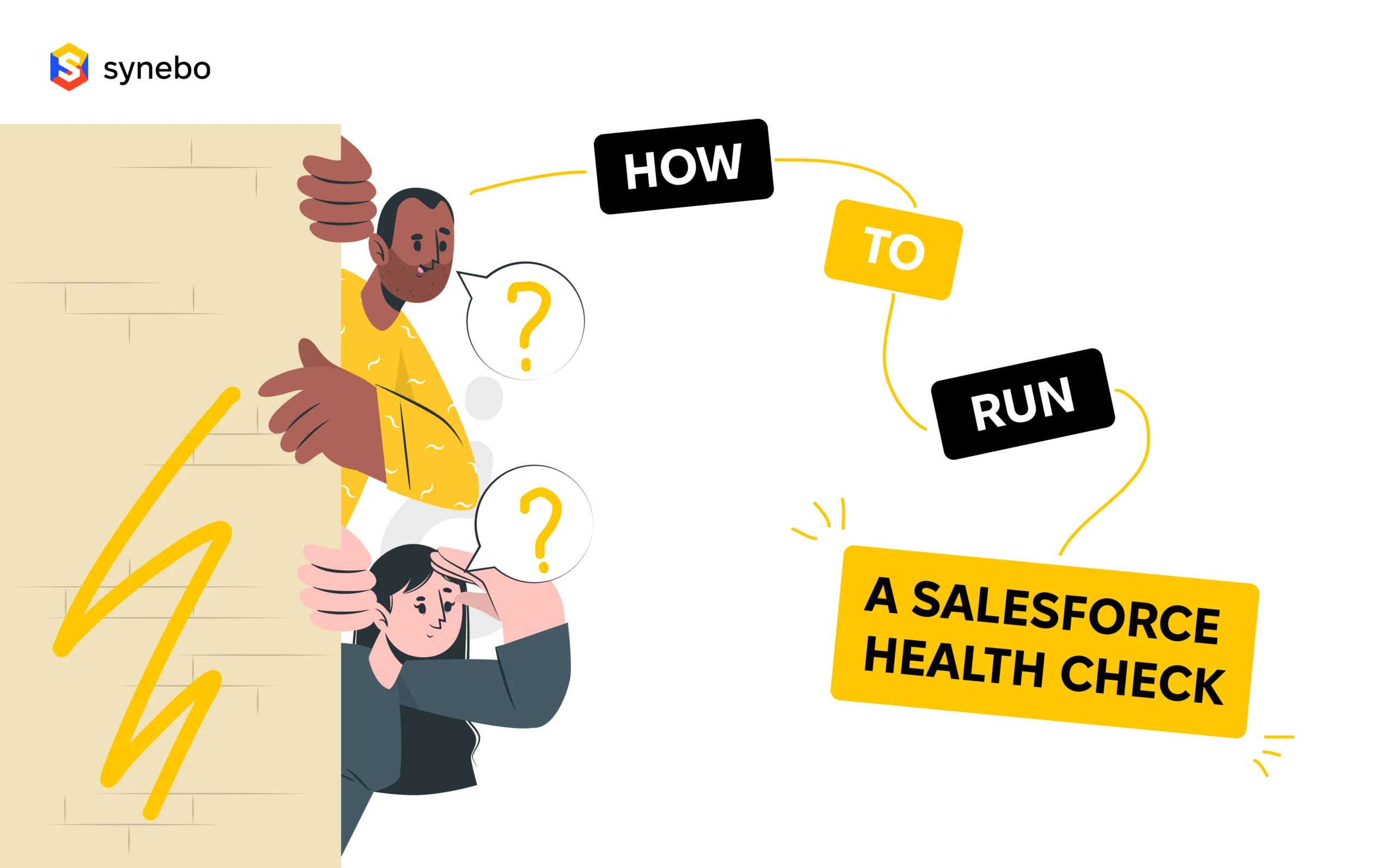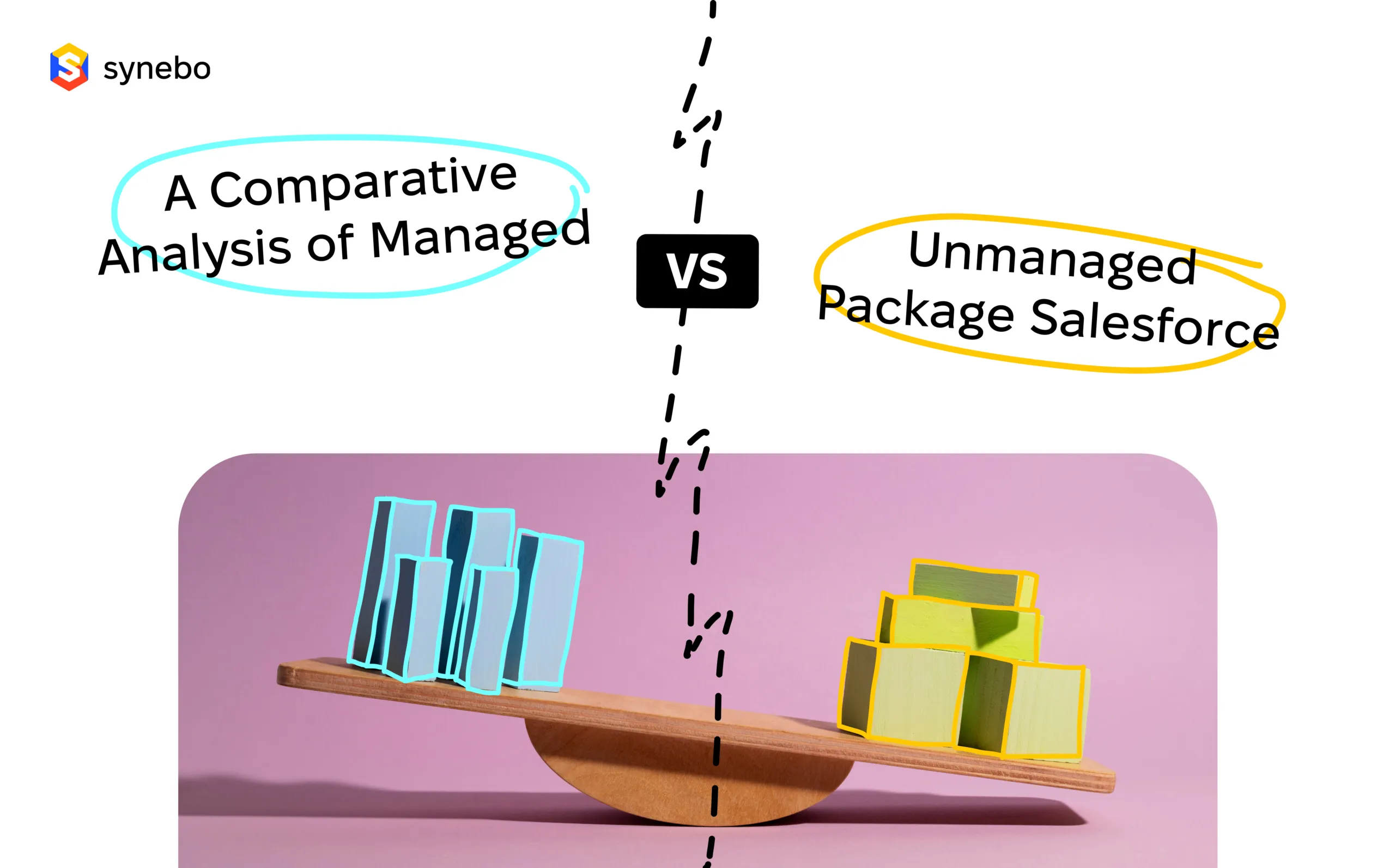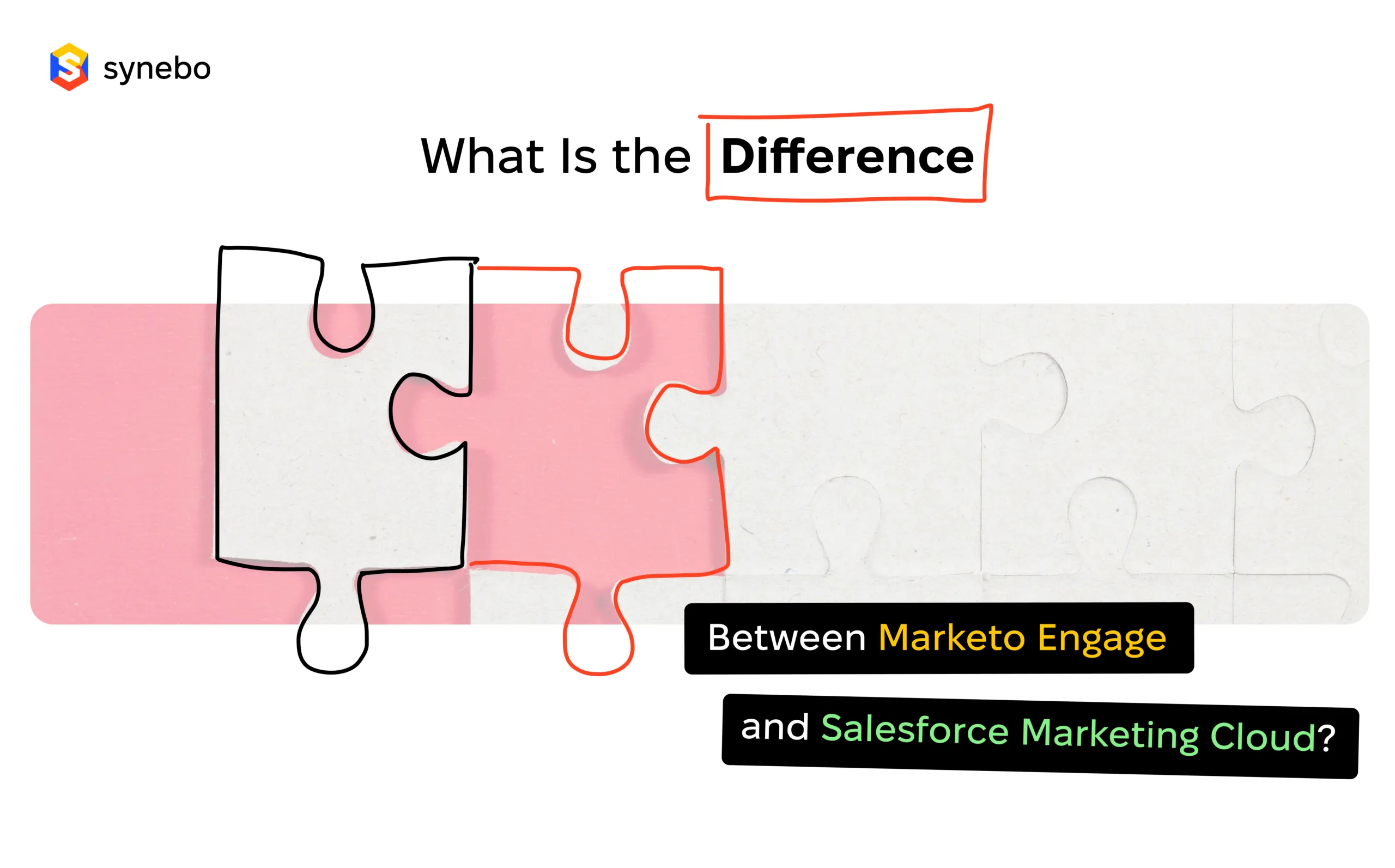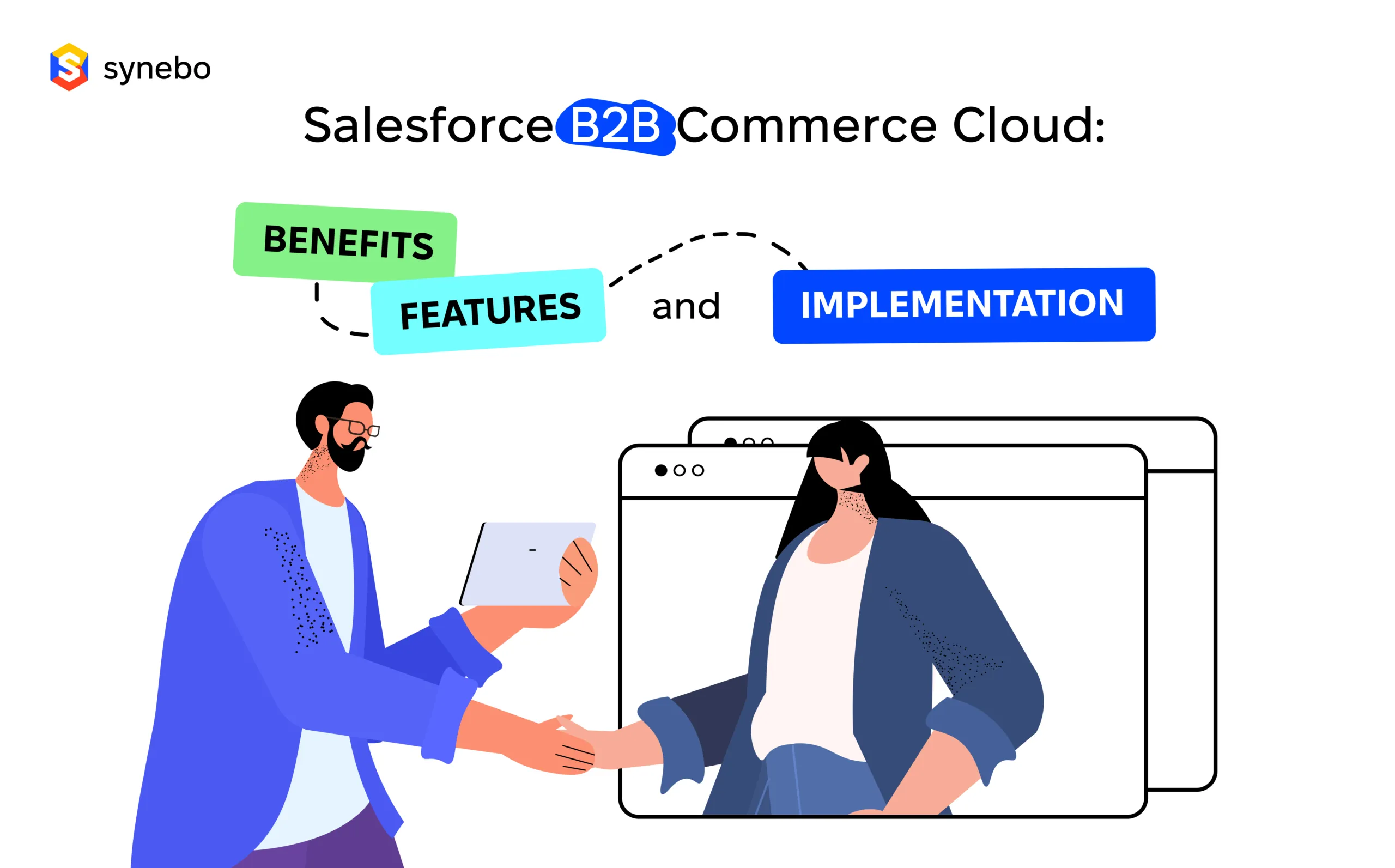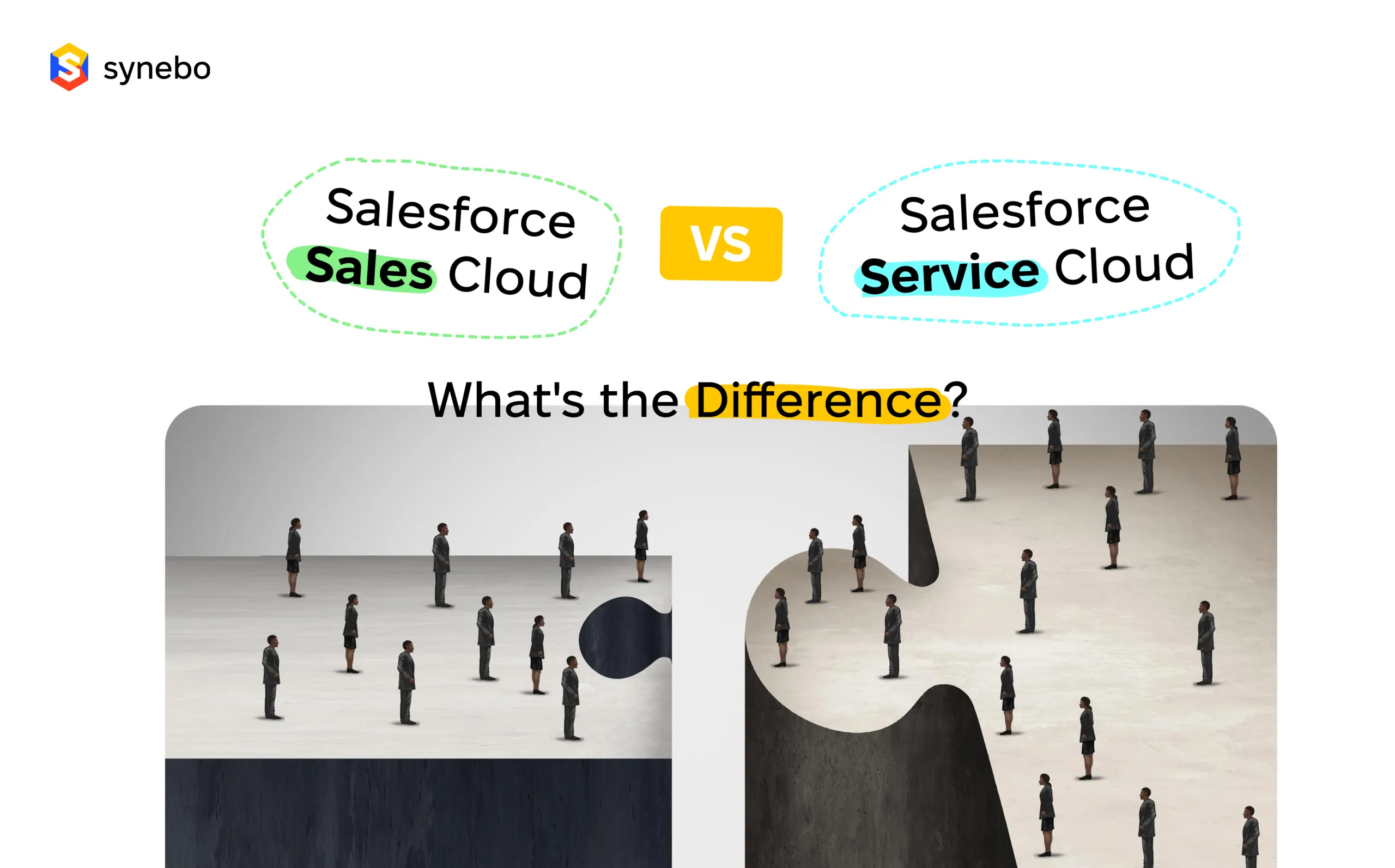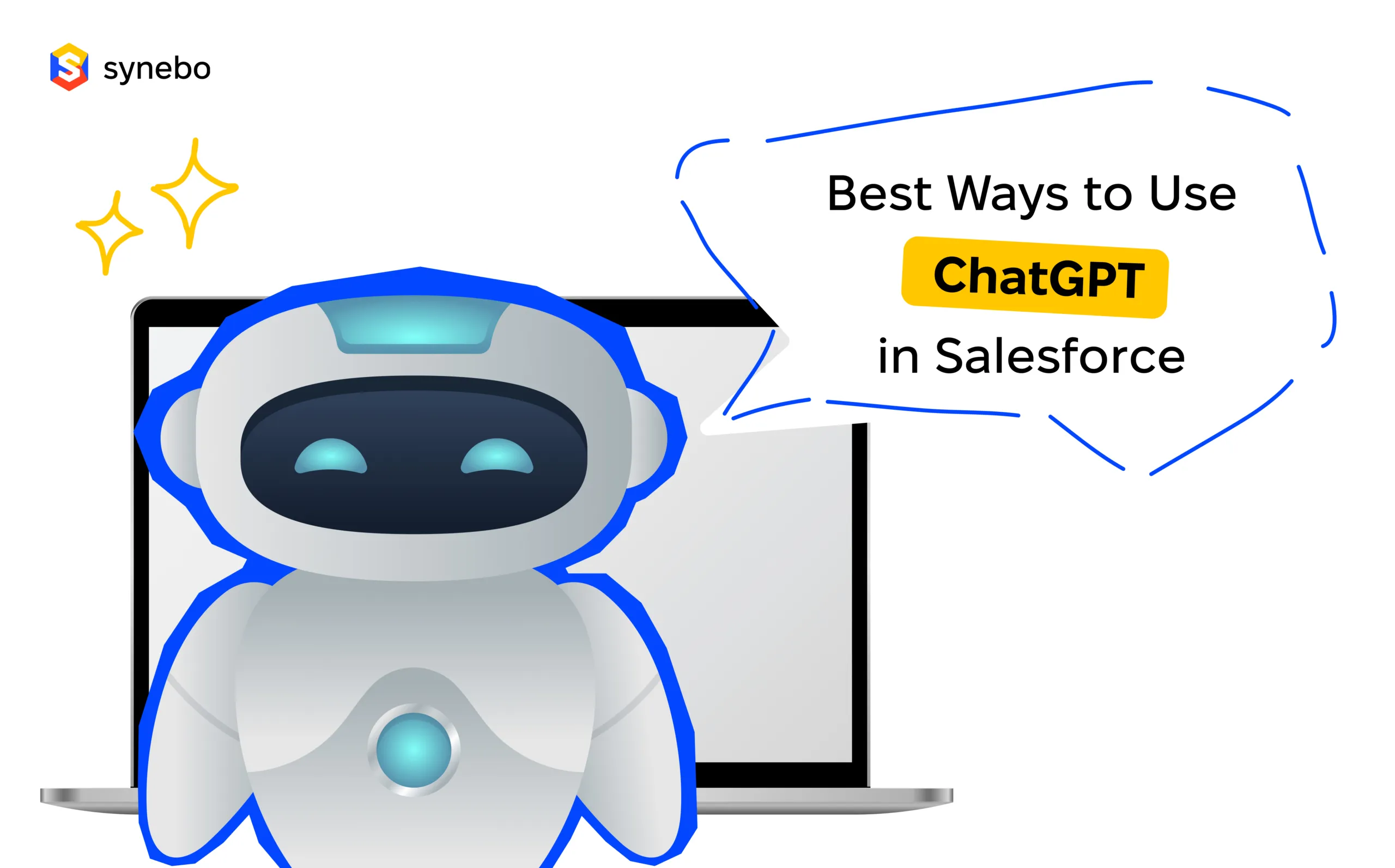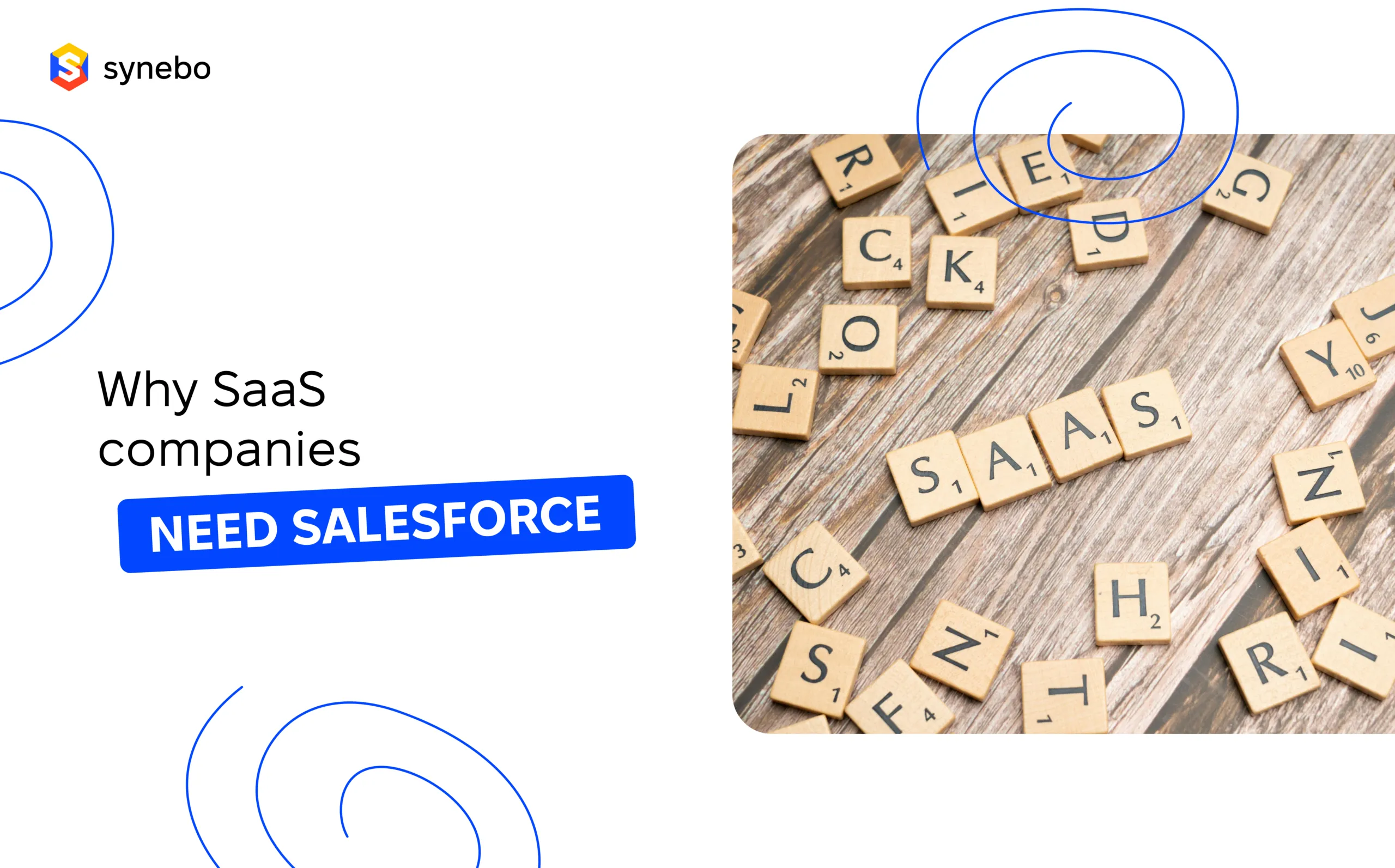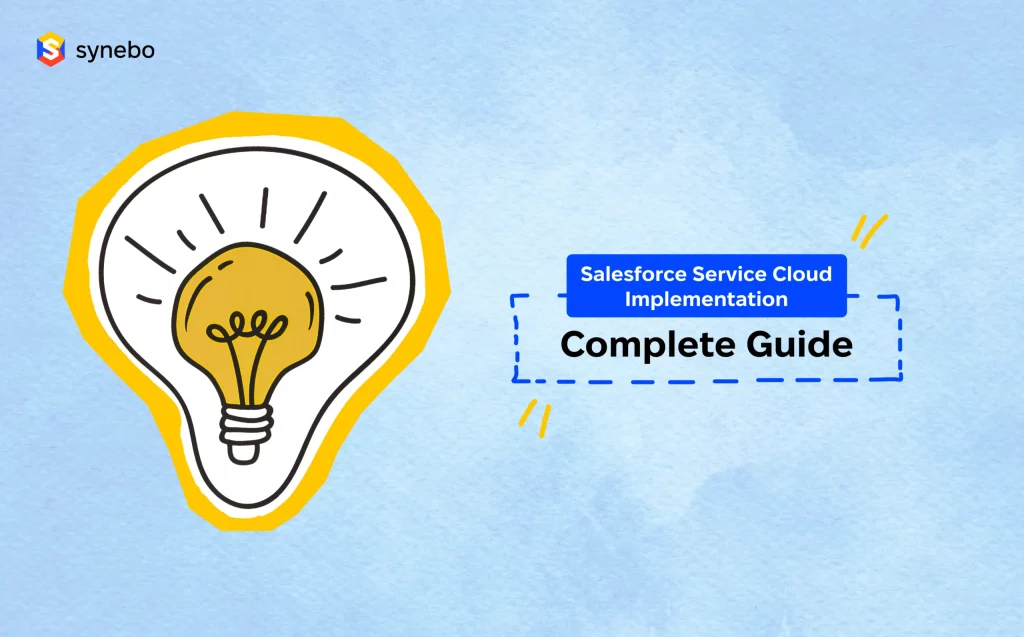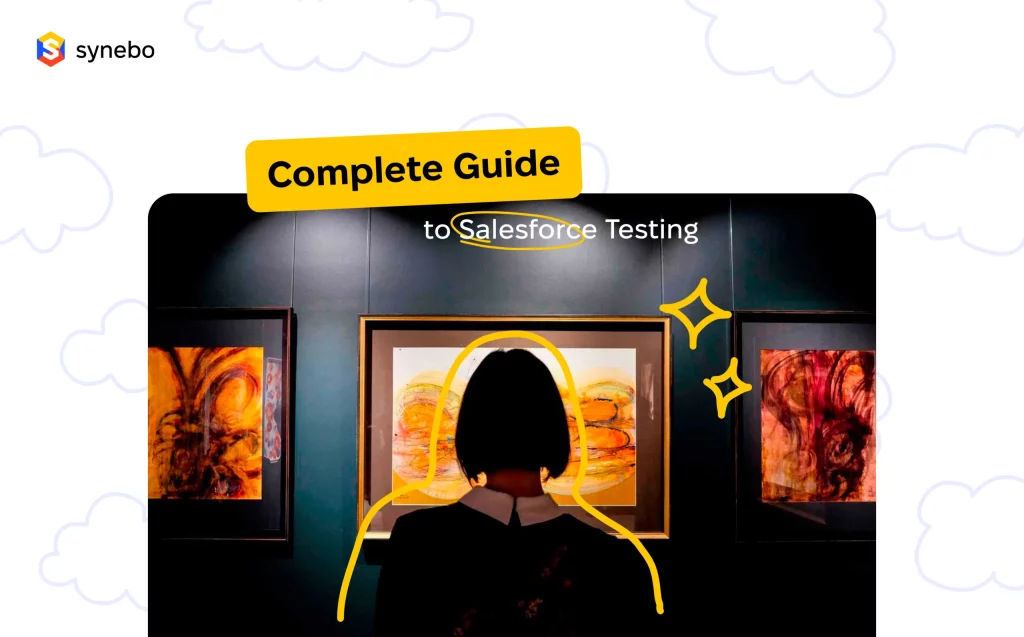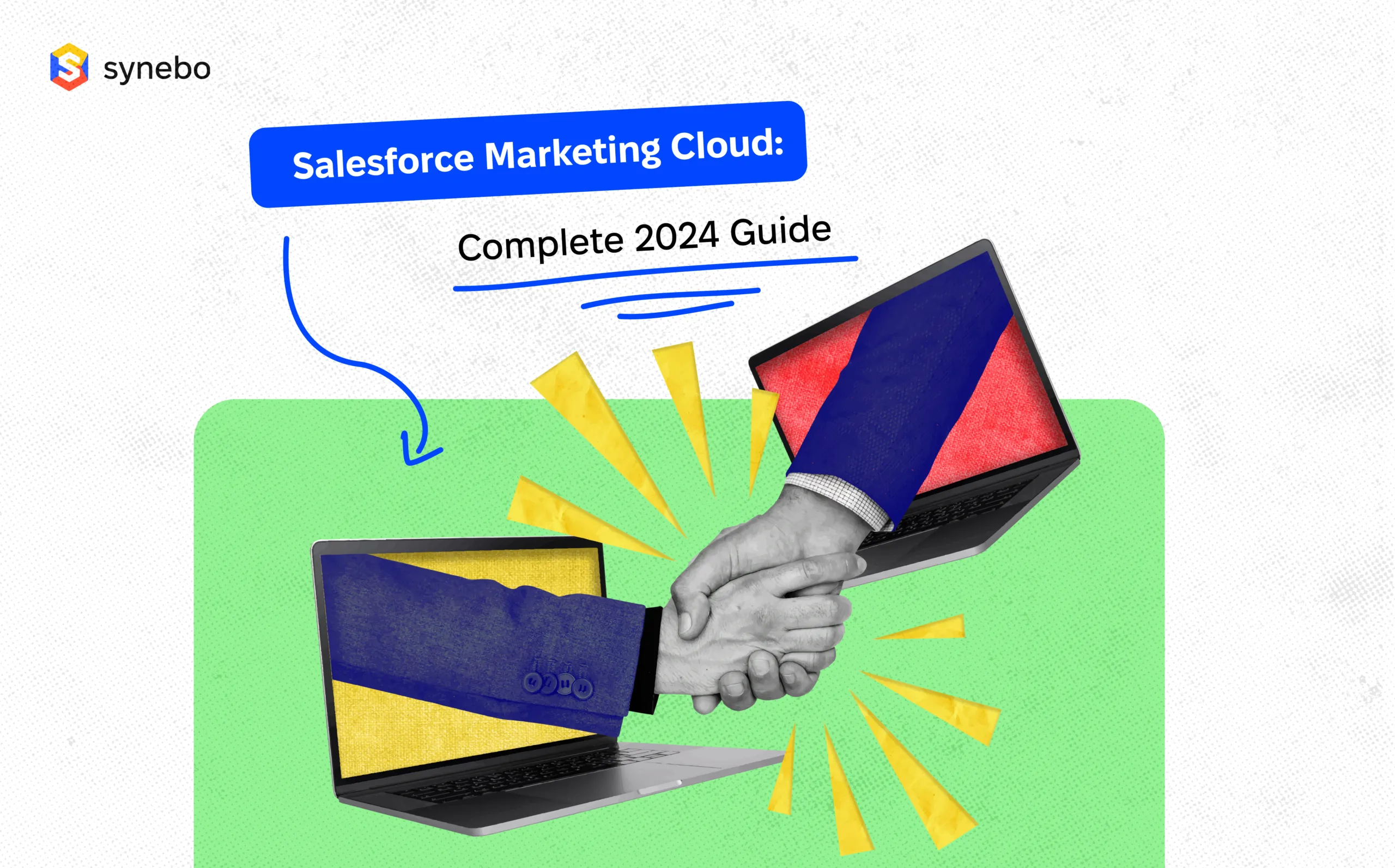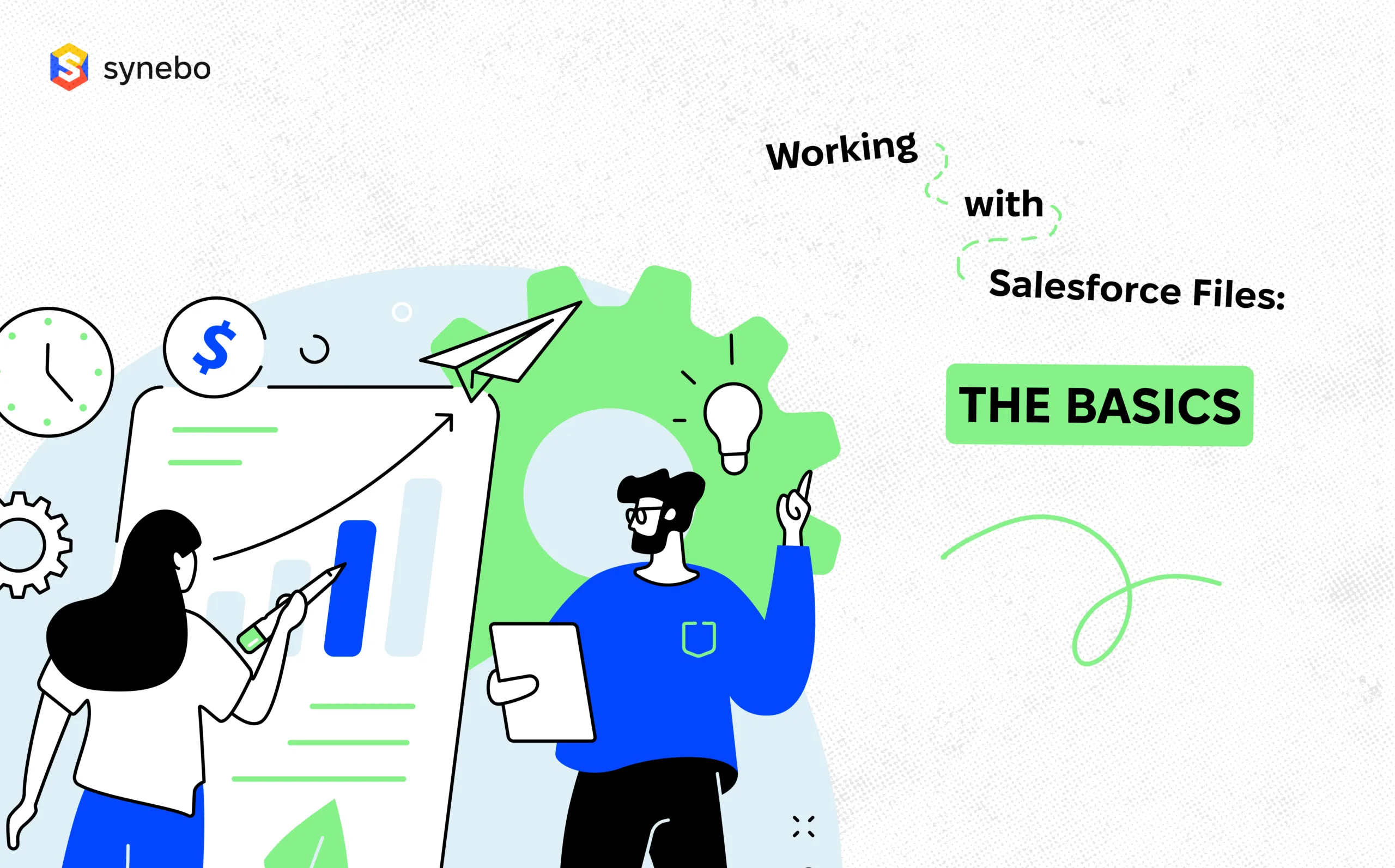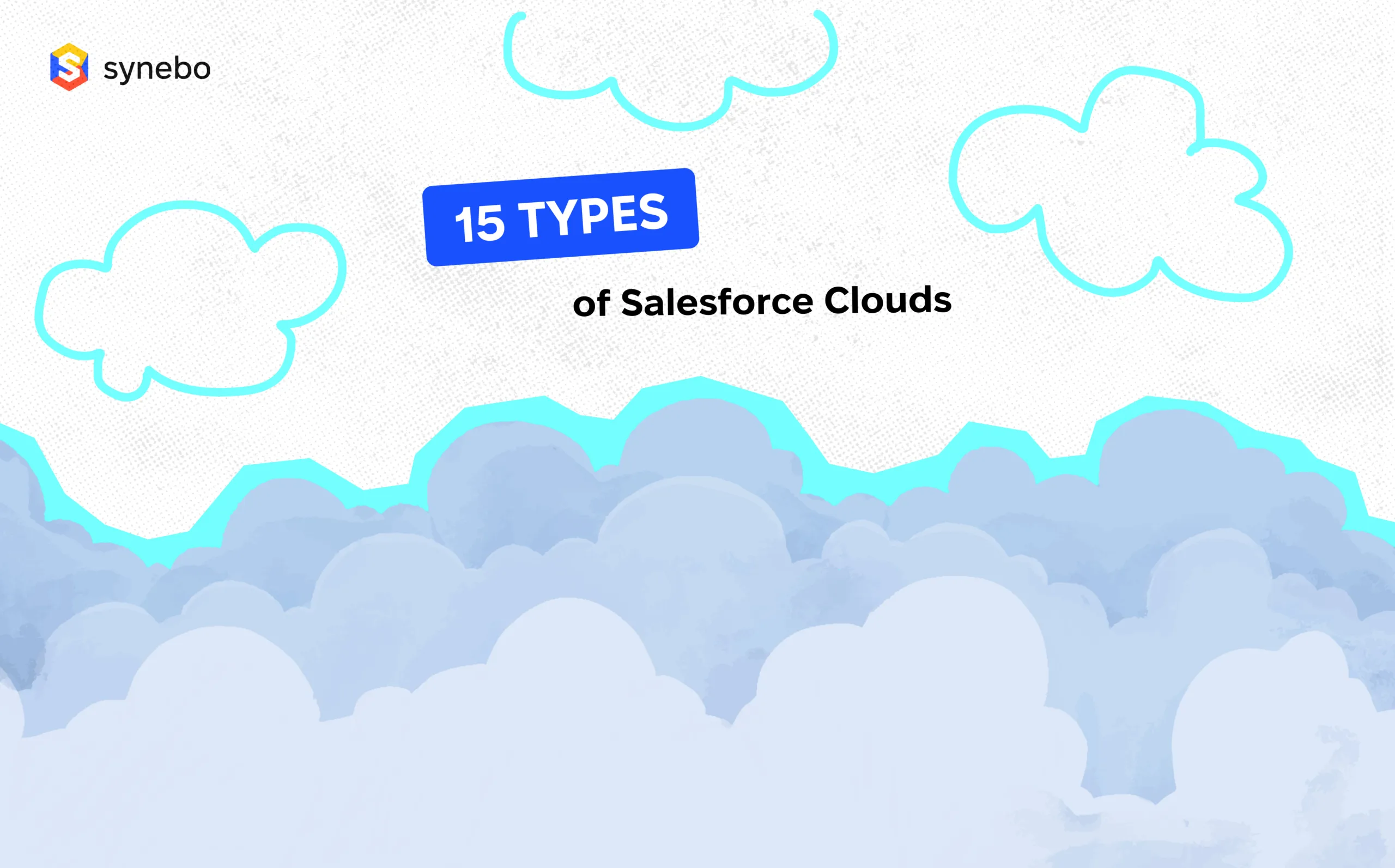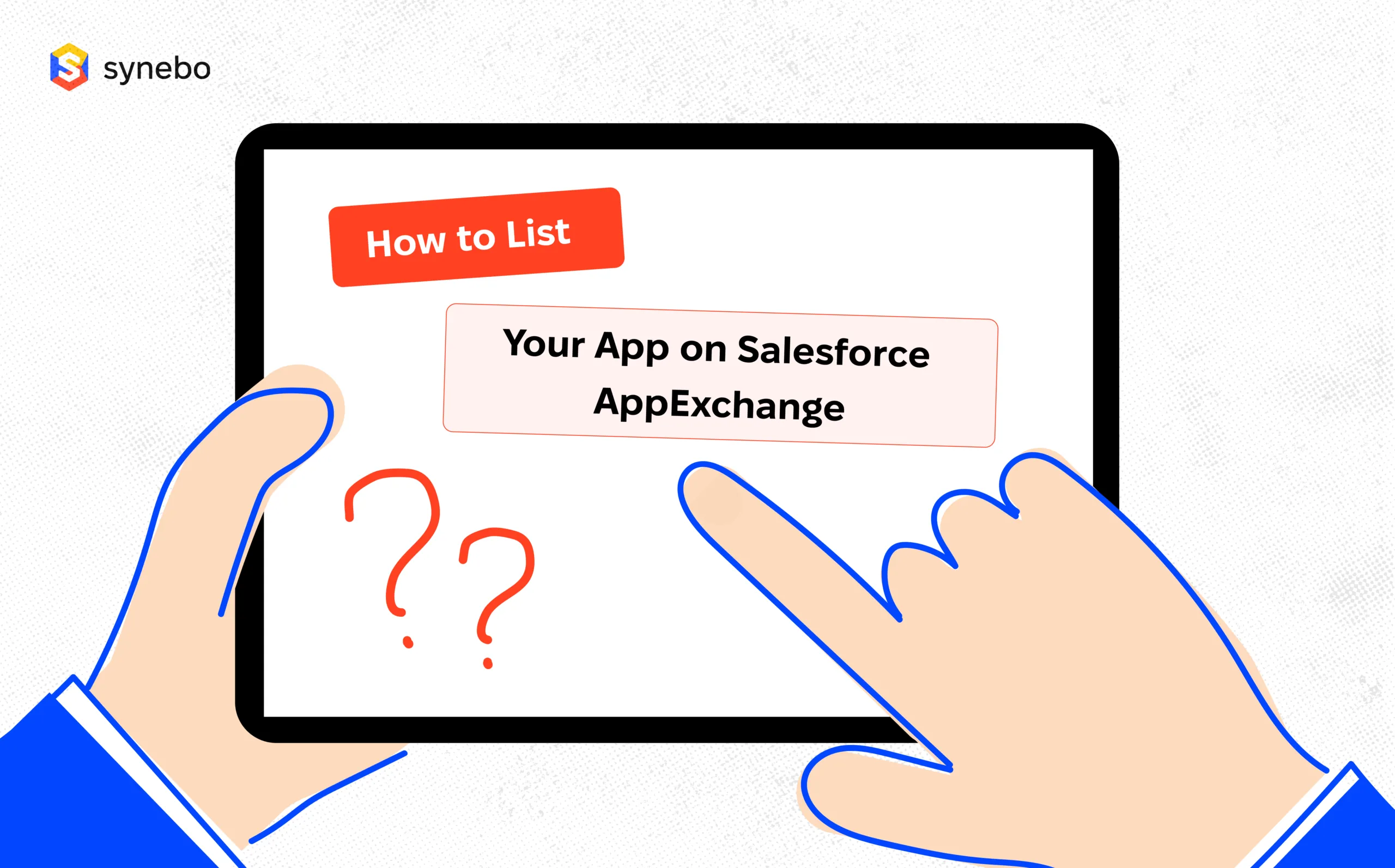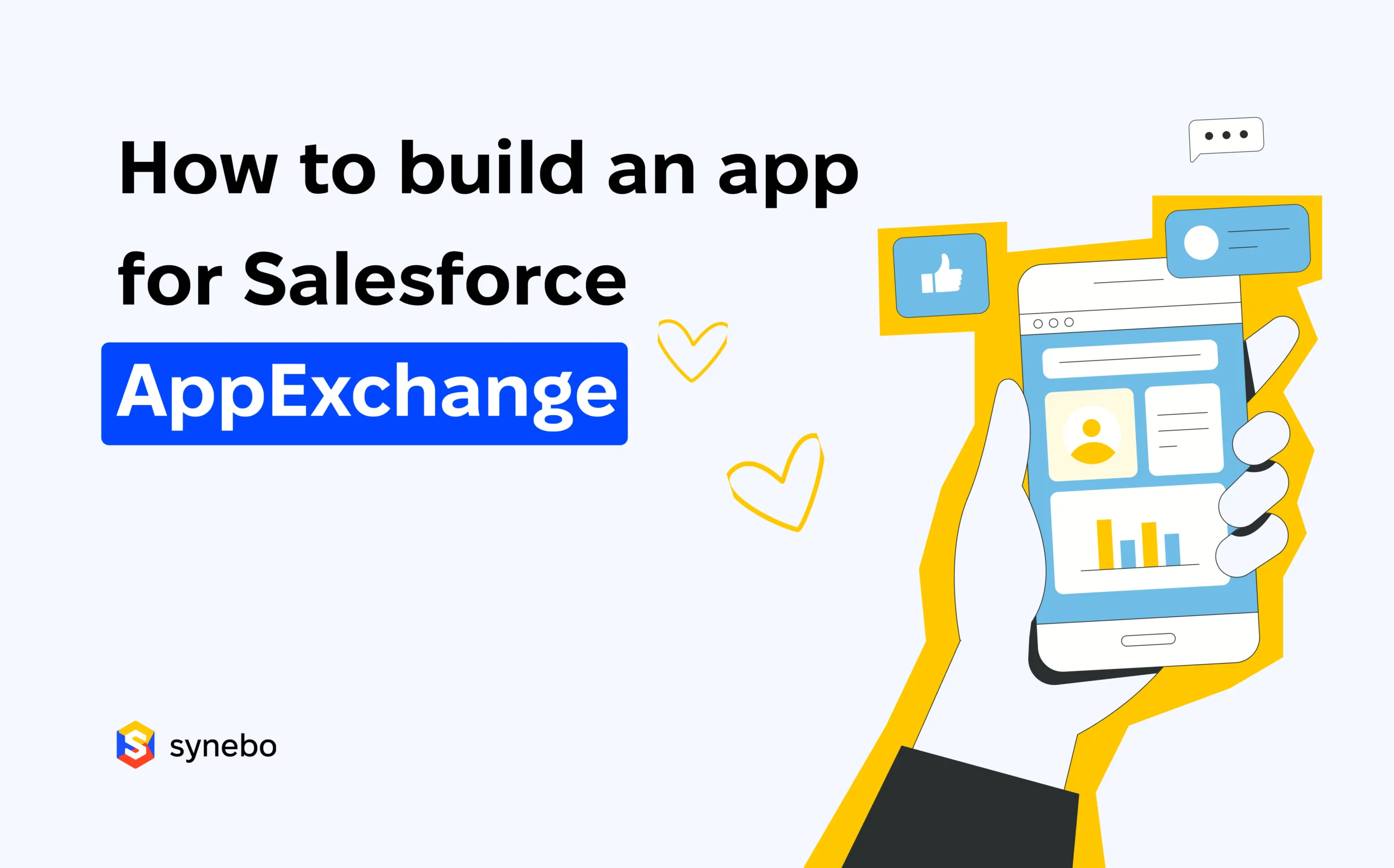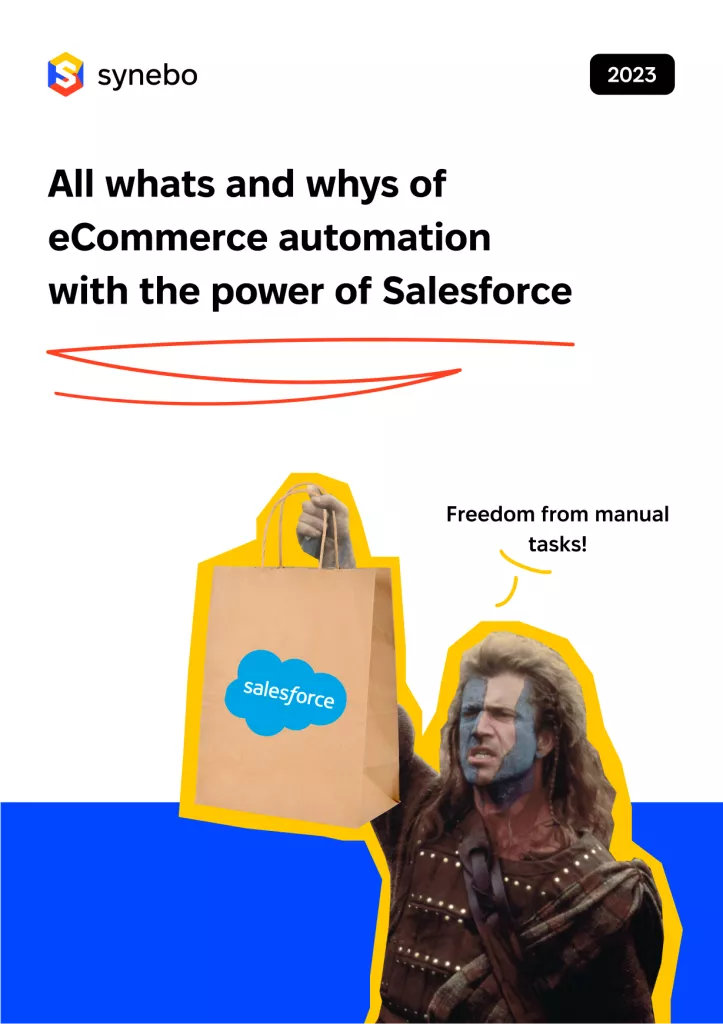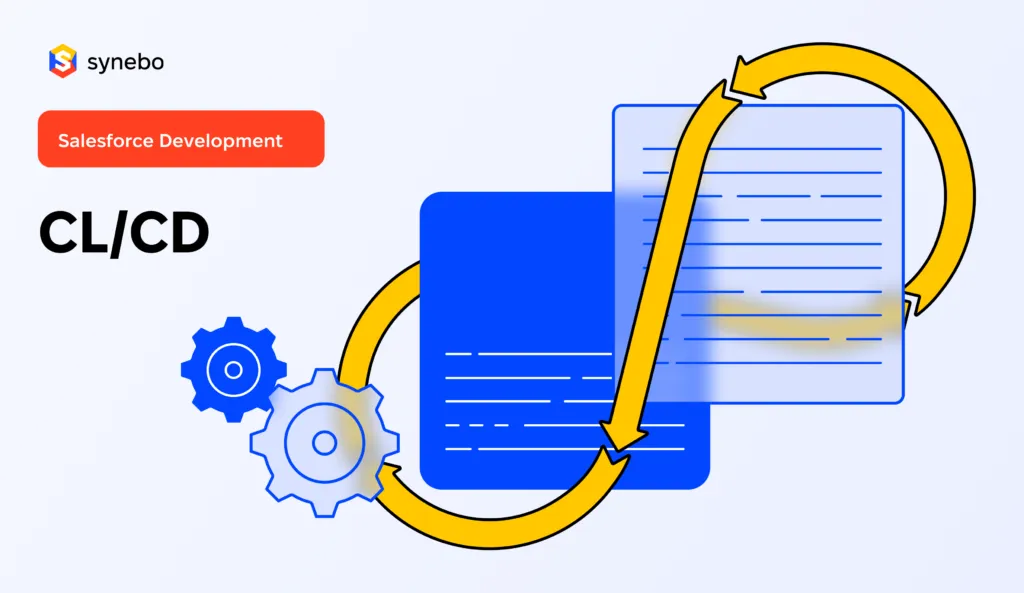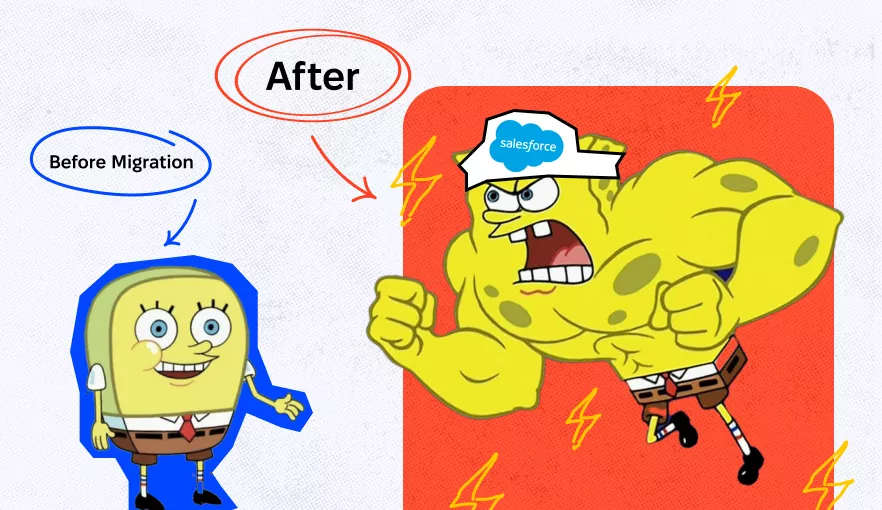Marketing Cloud Account Engagement (Pardot) vs Marketing Cloud: What’s the Difference?
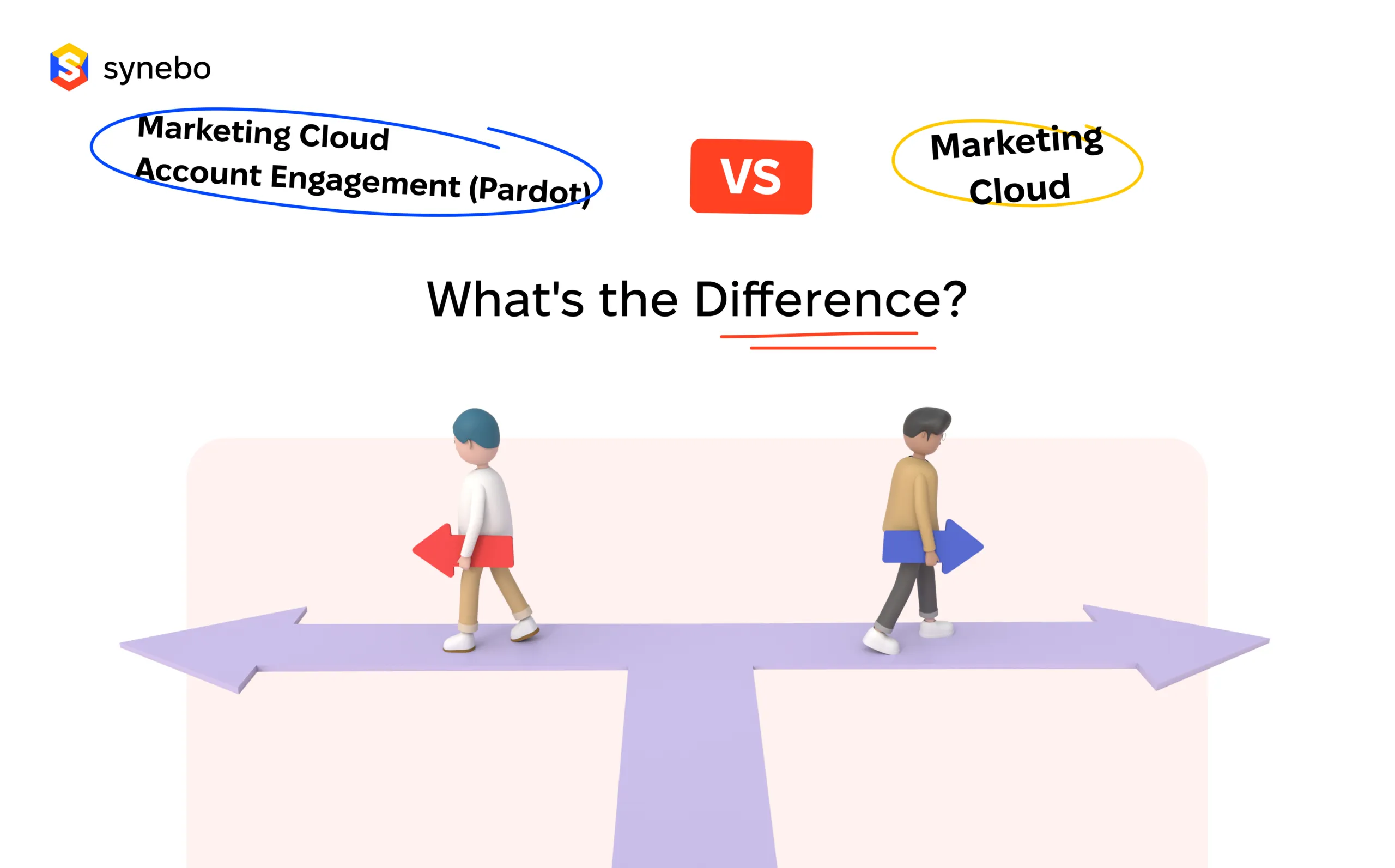
Here at Synebo, we emphasize the importance of selecting the right marketing automation tool within the Salesforce ecosystem, specifically between Marketing Cloud Account Engagement (Pardot) and Marketing Cloud. Each platform offers unique features, but understanding their differences is crucial for maximizing ROI.
Poor data quality can lead to significant revenue loss, around 12%, according to Experian Data Quality. Conversely, leveraging Salesforce Marketing Cloud might boost your ROI by nearly 300%, highlighting the importance of a strategic choice in marketing automation tools.
In this article, we’ll delve into a comparison of Marketing Cloud Account Engagement (Pardot) and Salesforce Marketing Cloud, examining pricing, pros and cons, and obtaining insights on how to choose the best tool for your business needs.
Understanding Marketing Cloud Account Engagement (Pardot) and Marketing Cloud
Before diving into the differences between Marketing Cloud Account Engagement (Pardot) and Marketing Cloud, it’s important to have a clear understanding of each.
Both Marketing Cloud Account Engagement (Pardot) and Salesforce Marketing Cloud are powerful tools in the Salesforce ecosystem, offering unique features and capabilities to help businesses drive their marketing efforts to new heights.
What’s Marketing Cloud Account Engagement (Pardot)?
Marketing Cloud Account Engagement is a marketing automation solution designed to streamline lead generation and nurture campaigns.
Marketing Cloud Account Engagement enables marketers to create personalized email campaigns, track prospect engagement, and automate marketing processes. Marketing Cloud Account Engagement offers robust lead scoring and grading capabilities, helping sales teams focus their efforts on the most qualified leads.
Furthermore, Marketing Cloud Account Engagement provides insightful analytics and reporting tools that allow marketers to measure the effectiveness of their campaigns and make data-driven decisions to optimize their strategies.
What’s Marketing Cloud?
Marketing Cloud is a comprehensive digital marketing platform that allows businesses to create, manage, and optimize multi-channel marketing campaigns.
With Marketing Cloud, marketers can leverage email marketing, mobile messaging, social media advertising, web personalization, and more to engage customers throughout their entire journey.
In addition to its multi-channel capabilities, Salesforce Marketing Cloud offers advanced automation features, predictive analytics, and AI-driven personalization to deliver targeted and relevant content to customers at the right time and through the right channels.
Interested in more? Dive into our detailed guide to Salesforce Marketing Cloud in our insights section.
Key Features of Marketing Cloud Account Engagement (Pardot) and Marketing Cloud
When comparing Marketing Cloud Account Engagement (Pardot) and Marketing Cloud, it’s essential to evaluate their respective features to determine which tool aligns with your marketing objectives.
Both Marketing Cloud Account Engagement and Salesforce Marketing Cloud are powerful marketing automation platforms offered by Salesforce. While they share some similarities, each platform has its own unique set of features that cater to different marketing needs.
Marketing Cloud Account Engagement Features
Marketing Cloud Account Engagement is known for its robust capabilities in B2B marketing. It excels in lead generation and nurturing, making it an ideal choice for businesses looking to target other businesses.
- Lead generation & nurturing. Harness tools like landing pages, forms, and email campaigns to attract and guide leads through the buying process.
- Lead scoring & grading. Evaluate leads with scores and grades to identify sales-readiness and engagement levels, ensuring sales teams focus on high-potential prospects.
- Marketing automation. Simplify repetitive tasks such as email campaigns and lead management to enhance efficiency and consistency.
- Seamless CRM integration. Enjoy a flawless link with Salesforce CRM, enabling a cohesive data flow and fostering synergy between marketing and sales departments.
- Advanced reporting & analytics. Monitor campaign outcomes, dissect lead behaviors, and extract actionable insights to refine marketing approaches.
Looking for a trusted development company to help implement a Salesforce solution? Drop Synebo team a line.
Marketing Cloud’s Features
Salesforce Marketing Cloud takes a more comprehensive approach to digital marketing, offering a wide range of tools for creating personalized customer experiences.
- Journey builder. Utilize a user-friendly interface to create and manage customized customer paths across emails, social media, and mobile platforms.
- Advanced segmentation. Segment audiences with precision using detailed demographic, behavioral, and custom criteria to tailor marketing messages.
- Omnichannel marketing. Orchestrate marketing initiatives across various channels to ensure a cohesive and personalized customer experience at each interaction.
- Content management & workflows. Streamline content creation and distribution across channels with automated workflows for efficient delivery.
- Predictive intelligence. Employ AI and machine learning to understand customer preferences and tailor marketing efforts for enhanced engagement and results.
Advanced analytics & reporting. Obtain deep insights into campaign effectiveness, customer actions, and return on marketing investments through comprehensive analytics.
You can discover when it’s better to use Marketing Cloud Account Engagement (Pardot) and when Marketing Cloud from the below infographic:
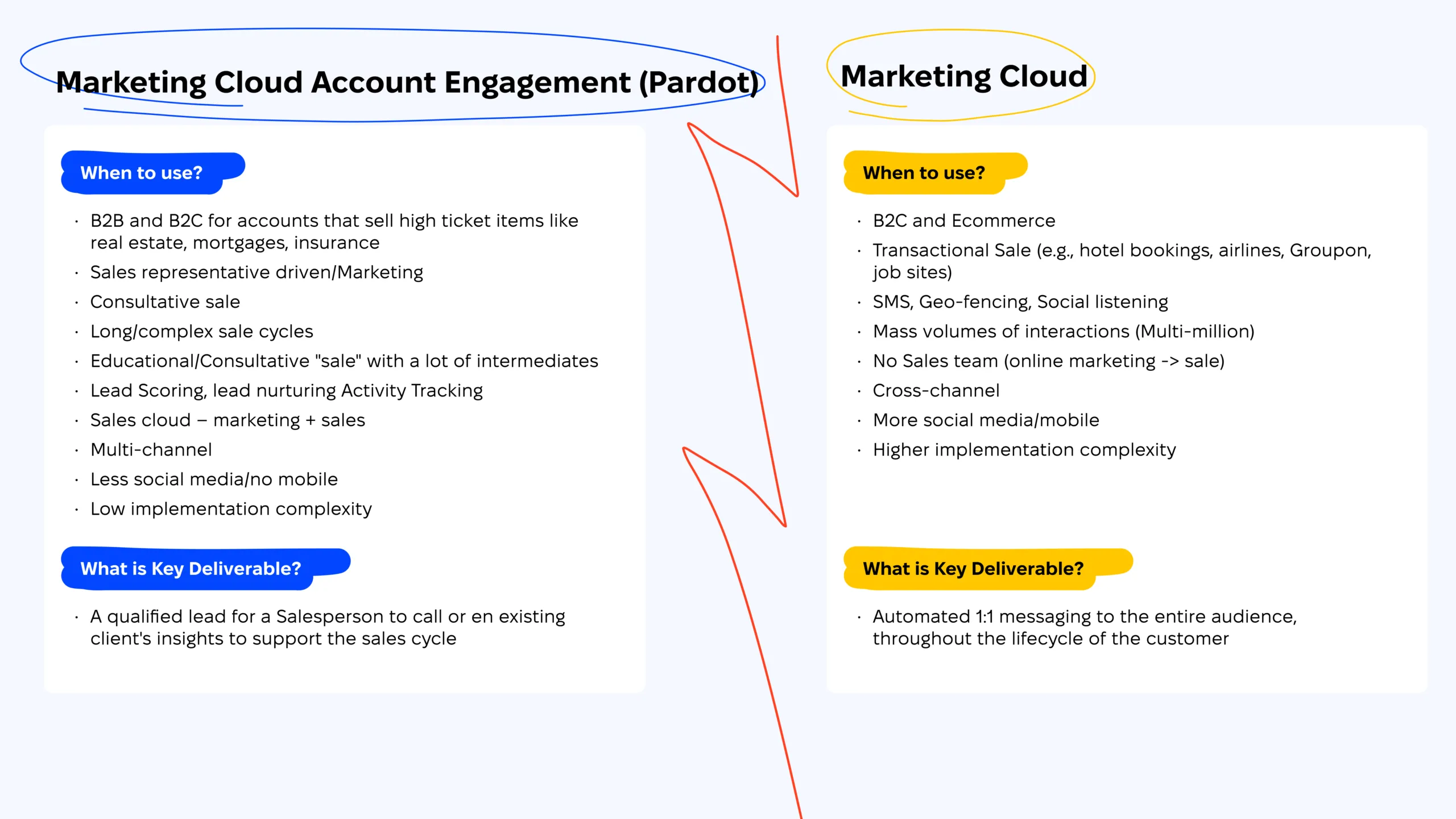
You may also be interested in reviewing 15 types of Salesforce Clouds from another blog post.
Pricing Comparison: Marketing Cloud Account Engagement (Pardot) vs Marketing Cloud
When considering any marketing automation tool, pricing is an important factor to consider. Let’s take a closer look at the pricing structures of Marketing Cloud Account Engagement and Marketing Cloud.
Understanding the pricing models of marketing automation tools like Marketing Cloud Account Engagement and Salesforce Marketing Cloud can help businesses make informed decisions when choosing the right platform for their needs. Both Marketing Cloud Account Engagement (Pardot) and Marketing Cloud offer a range of pricing options to accommodate different business sizes and requirements.
| Marketing Cloud Account Engagement | Marketing Cloud | |
| Pricing Model | Tiered Subscriptions | Modular |
| Price Range | $1,250 – $4,000 per month | Varies depending on chosen products and volume (e.g., email sends, contacts, data storage) |
| Additional Features | May require add-on costs | May require additional modules |
Marketing Cloud Account Engagement (Pardot) Pricing Structure
Marketing Cloud Account Engagement pricing is based on the number of users and the level of functionality required. It offers tiered pricing plans starting from the “Growth” plan, which includes basic marketing automation features, up to the “Advanced” and “Premium” plans, which provide advanced functionality and support.
Businesses opting for Marketing Cloud Account Engagement can benefit from features such as lead management, email marketing, and ROI reporting. The pricing structure of Pardot allows businesses to choose a plan that aligns with their specific marketing automation needs and budget constraints.
Marketing Cloud Pricing Structure
Marketing Cloud pricing varies based on the number of users and the level of functionality required. It offers scalable pricing plans that cater to both small businesses and enterprise-level organizations. As Salesforce Marketing Cloud is a more comprehensive tool, the pricing tends to be higher compared to Marketing Cloud Account Engagement.
Marketing Cloud provides a wide range of features, including email marketing, social media advertising, customer journey mapping, and analytics. The platform is designed to cater to the complex marketing needs of large organizations, offering advanced tools for personalized customer engagement and campaign management.
Seeking a reliable Salesforce consulting partner? Contact Synebo today, and let us guide you in choosing between Marketing Cloud Account Engagement and Marketing Cloud for your needs.
Pros and Cons of Marketing Cloud Account Engagement (Pardot)
While Marketing Cloud Account Engagement boasts a range of functionalities to empower B2B businesses, it’s crucial to weigh both its strengths and limitations before making a decision.
Pros of Marketing Cloud Account Engagement:
- B2B specialization. Excelling in lead generation and nurturing tailored for B2B contexts.
- CRM integration. Offers seamless Salesforce CRM integration for enhanced data insights and sales alignment.
- Lead prioritization. Features advanced scoring and grading to help prioritize leads effectively.
- Robust reporting. Enables detailed campaign analysis to refine and optimize marketing efforts.
- Behavioral insights. Tracks prospect interactions for deeper understanding and highly targeted campaigns.
- Marketing automation. Streamlines processes, saving time and increasing efficiency.
Cons of Marketing Cloud Account Engagement:
- Feature limitations. May not provide the advanced personalization and automation capabilities found in Marketing Cloud.
- Steep learning curve. Demands time and effort to master, potentially slowing down campaign deployment.
Pros and Cons of Marketing Cloud
Exploring Marketing Cloud, we find both benefits and challenges. Let’s examine its pros and cons.
Pros of Marketing Cloud:
- Multi-channel marketing. Offers tools for executing comprehensive, omnichannel marketing strategies.
- Advanced segmentation. Enables precise targeting with detailed segmentation tools.
- Salesforce integration. Integrates smoothly with Salesforce suite for a cohesive customer overview.
- Scalability. Aptly manages large-scale and complex marketing campaigns.
- Personalization. Delivers customized experiences to enhance customer engagement and conversions.
Cons of Marketing Cloud:
- Complexity. Presents a significant learning curve due to its extensive features.
- Cost Considerations. Higher pricing might be a barrier for smaller organizations.
- Implementation Challenge. Requires considerable time and resources for effective utilization and ongoing maintenance.
Looking for more insights? Check out our article on Salesforce Experience Cloud and discover its benefits in our insights section.
What to Choose: Marketing Cloud Account Engagement or Marketing Cloud?
Choosing the right marketing automation tool for your business requires careful consideration of various factors. Here are four key factors to consider when making your decision:
#1 Business objectives and goals. Assess your organization’s marketing objectives and determine which tool aligns best with your goals.
#2 Target audience and channels. Consider your target audience and the channels through which you engage with them. Evaluate which tool provides the necessary functionality to reach your audience effectively.
#3 Integration with existing systems. Evaluate the compatibility of both Marketing Cloud Account Engagement and Marketing Cloud with your existing CRM and other marketing tools.
#4 Ease of use and support. Consider the ease of use of each tool and the support available from the vendor or implementation partner.
You may also be interested in reading about Salesforce Sales Cloud and how its comprehensive suite of CRM tools and resources can streamline your sales processes.
Final Take: Which Is Best for Your Business Needs?
Choosing between Marketing Cloud Account Engagement and Marketing Cloud depends on your specific business needs. Marketing Cloud Account Engagement is best for B2B companies focusing on lead management with features like lead scoring and Salesforce integration. Marketing Cloud is ideal for businesses aiming for broad, multi-channel marketing to engage customers through email, social media, and the web.
Synebo specializes in Salesforce solutions, guiding you to pick the right tool for your goals. Over 8 years on the market, our experts have a wealth of experience in implementing both platforms for various clients. We understand each business is unique, and we’ll help you make an informed choice that boosts your marketing results.










